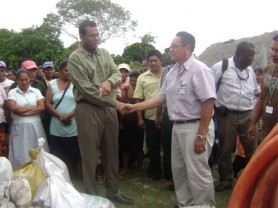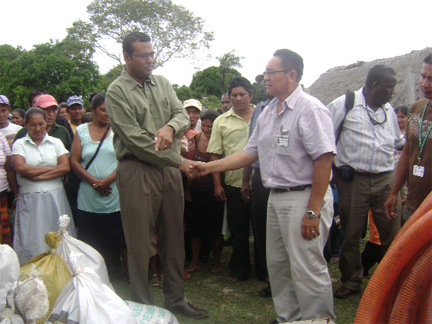– as El Nino scorches Rupununi
Government is purchasing Brazilian peanuts to boost the upcoming crop in the Rupununi. A poor harvest last year, blamed on the dry weather phenomenon – El Nino – left farmers with little stocks.

Agriculture Minister Robert Persaud told worried farmers yesterday in Aishalton, Deep South Rupununi that 4,000 pounds of peanuts would arrive in the country next week. Peanut is a major cash crop in the Rupununi, Region Nine.
The new planting season begins in May and farmers said that after El Nino ruined the crop last year, they do not have enough seeds to plant. Chairman of Region Nine, Clarindo Lucas had told Stabroek News recently that they had written to the government for help.
Asked whether 4,000 pounds would be enough, Persaud told this newspaper that a needs assessment was done. He said that some farmers have stocks. The Brazilian peanuts will be distributed across the Rupununi. Just under $1 million was expended to purchase the nuts, Persaud said.
Farmers from Aishalton and nearby Karaudarnau told the minister they are coping with the dry weather. However, if the rains do not come soon “we will be in big trouble”, said Aishalton Deputy Toshao, Kid James.
Currently, farmers said, acoushi ants are damaging crops. Dorothy James said that fogging machines are vital since the ants are ignoring bait placed at their nests. She stated that such machines should be placed in every village once there is the chemical to spray the pest. She explained that sometimes the chemical is unavailable.
A portion of these was handed over to the village by Persaud. He said that the ministry will be purchasing 100 Bomba pumps from Brazil to combat the pest and 20 of these machines would be for the South Rupununi.
Yesterday’s visit was part of the ministry’s El Nino outreach and Persaud also gave the village planting materials, food supplies and a water pump.
He said that further supplies will be sent from Georgetown shortly. So far, he said, just under $500 million has been spent across the country by government to combat the effects of El Nino. Persaud said that his ministry has already provided equipment and supplies to some Rupununi communities.
At the meeting – held in the Aishalton Community Centre – residents spoke of their concerns. Ernest Thompson from Karaudarnau said that the last peanut and rice crops were poor. Karaudarnau cultivates rice on a semi-commercial basis.
“We can provide seed material from Georgetown,” Persaud responded on rice. He added that officials from the Guyana Rice Development Board would visit the community soon to examine expanding a rice and beans project, currently being piloted in the North Rupununi.
He also disclosed that a vet will be posted to the community shortly. A resident called for a crop extension officer to be sent to the community. Persaud responded that if a house is available, one can be sent there within three weeks.
Deputy Toshao Kid James said that no Agricultural Science teacher was ever employed at the Aishalton Secondary School and Persaud, expressing his disappointment, said that he had sought to work with the Ministry of Education on this issue.
LCDS
Meantime, residents asked about further consultations on the Low Carbon Development Strategy (LCDS). Persaud had earlier stated that government hopes to continue consultations on REDD+ “very soon”. He said that this had been delayed because the World Bank did not disburse resources and only a few days ago were documents received from them.
Given that there was no agreement at the Copenhagen climate conference, Toshao Hildebrand James asked where money would come from if Amerindian communities “opt in” to the LCDS.
Deputy Toshao James asserted that the first outreach programme last year was the only “true” consultation on the LCDS. He said there are still key issues that need to be addressed including untitled land and extension of land. He declared that this should be dealt with urgently to avoid future problems.
“We had a consultation. We were not consulted,” one participant said. One woman said that people came in, spoke in a language that many residents did not understand and then they were asked to give a response. She said that they were handed a 57-page technical document to read and expected to give a response to it.
In response, Persaud said that there were supposed to be additional consultations and under the World Bank, government would have received additional resources. He said consultations would continue and this time, would be shaped by the National Toshaos Council and no community would be forced to “opt in” to the LCDS. On extension of land, he said that discussions have to take place. The minister pointed out that it costs almost $30 million to demarcate one community. He said that consultations are not an event but a process.

